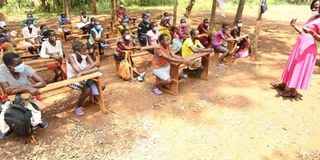Engage teens in sexual reproduction forums

What you need to know:
- Increased engagement with adolescents regarding their sexual and reproductive health has been identified as a significant precursor in reducing teenage pregnancies in the country.
- Blame on teen pregnancy has been shifted to parents and teachers, who are viewed as custodians of children and teenagers.
- While the rate of teenage pregnancies being witnessed this year is shocking, it does not significantly vary from years before.
- In addressing teenage pregnancies, there is a dilemma in deciding whether to give our children access to contraceptives or teaching them that early sexual activities is not morally acceptable.
Increased engagement with adolescents regarding their sexual and reproductive health has been identified as a significant precursor in reducing teenage pregnancies in the country.
A webinar discussion on the counties perspectives on teenage pregnancy in Kenya indicated that a majority of decisions made regarding adolescent health often neglect the voice of the teenagers, making intervention efforts ineffective.
As the number of teenage pregnancies continue to rise each year, concerns have been raised on the exact cause of the worrying trend.
As a result, blame has been shifted to parents and teachers, who are viewed as custodians of children and teenagers. Parents and guardians have been accused of neglecting their duties as overseers and mentors. They have also been blamed for not adequately educating their children on matters relating to sexual and reproductive health.
INCREASED ANTE-NATAL VISITS
The issue of teenage pregnancies has come to light in the past two months after counties raised an alarm of increased antenatal visits from school-going children.
This has been attributed to the temporary closure schools due to Covid-19. However, according to Makueni County Health CEC Dr Andrew Mulwa, teenage pregnancies is a recurring issue in most counties.
He noted that while the rate of teenage pregnancies being witnessed this year is shocking, it does not significantly vary from years before.
Data from the Kenya Data and Health Survey 2014 showed that 13,000 teenage girls drop out of school annually because of pregnancy.
Although the number of teenage pregnancies has reduced significantly in the past 25 years (by 61.8 per cent), the current number of teenage girls getting pregnant is significantly high.
Statistics from the Global Childhood Report in 2019, showed that Kenya had the third-highest teen pregnancy rates with 82 births per 1,000 births.
CONTRACEPTIVE MEASURES
With further data in 2014 illustrating that one in every five girls between 15-19 years is either pregnant or already a mother.
With these numbers in mind, it is clear the problem of teenage pregnancies goes beyond the effects of Covid-19 and schools’ closures. This then gives birth to a debate on the right approach in addressing teenage pregnancies, further revealing varied opinions between upholding moralities in adolescents and availing contraceptive measures.
Dr Mulwa prefers the former approach, in addition to engaging the youth in mentorship programs while utilising community responsibility.
“In addressing teenage pregnancies, there is a dilemma in deciding whether to give our children access to contraceptives or teaching them that early sexual activities is not morally acceptable,” he said.
PEER ENGAGEMENT
Part of this engagement approach is to involve adolescents through peer to peer engagement in developing youth-led interventions and policies for a better outcome.
“Teenagers can be engaged in mentorship programs on life skills and career advice that will keep them occupied and away from opportunities of engaging in early sexual activities,” he added.
Although this approach seems sensible, it might be difficult to implement as some teenagers are already presumed to be engaging in sexual activities either with their peers or other people in the community.
There is also the argument that some teenagers, particularly girls, engage in these activities due to financial challenges at home resulting to them not affording basic needs such as food and sanitary towels.
However, Gynaecologist Dr Wahome Ngare noted that there should be a focus on risk avoidance as opposed to risk reduction. This can be done through reinforcing right attitudes of teenagers not engaging in early sexual activities and parents taking up their role in protecting their children.
FAMILY SET UP
“Children need to be protected as they are not fully mature to make any choices on sex or the use of contraceptives. Thus, any decision should be parent oriented and should focus on the value of sex within the confines of the family set up rather than just talking about what is sex and how or where to have sex,” he said.
Parents were further challenged to be better communicators with their adolescent children, particularly with regard to their sexual reproductive health.
Kisii County Education Chief Officer Dr Doris Nyokangi explained that teenagers undergo significant changes in their bodies making them very curious and often feel the need to explore their sexuality.
“Teenagers want to know about their bodies, their sexual health and relationships going on around them. This is the opportunity that parents should take in making them aware of these issues as well as be there in the event their children need advice or guidance,” she said.
Dr Nyokangi further noted that such opportunities can also be used in breaking certain negative or false perceptions surrounding reproductive health as well as a chance to reinforce abstinence through open and honest dialogue.




